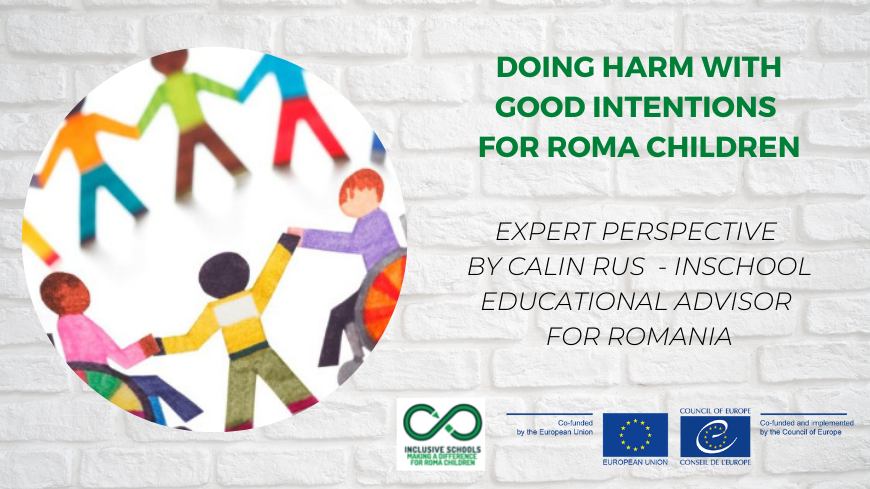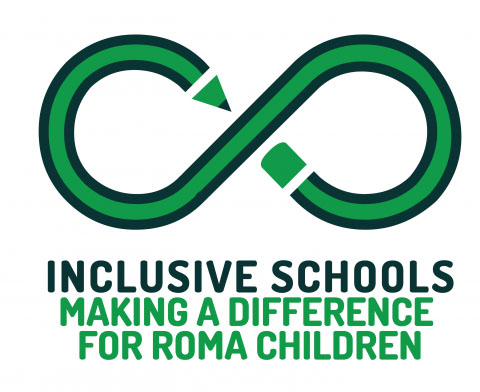The purpose of the paper is to draw the attention of readers of some risks that can be encountered when trying to do the “right thing” and in the efforts of improving the education of Roma children and does not intend to place blame on anyone.
Based on several theories developed and tested with the tools of social psychology, it will be argued that, under some circumstances, having good intentions is not only not enough, as it does not generate the positive outcome we expect, but it can even result in negative consequences.
Unfortunately, there is evidence that teachers who do not mean any harm, and who, in fact, want to do good, can harm children belonging to disadvantaged groups, such as the Roma, in many ways. Only some of these ways, the ones that are more likely to be present in the current context of the Covid19 pandemic, are described here. The four behaviours analysed below - showing compassion to Roma children and even providing them with additional material support, adapting expectations and requirements to the actual possibilities that Roma children have, offering a special encouragement during exams or tests, and enjoying the good feeling that comes after having done something additional to support Roma children - may all appear as something to encourage and appreciate, but in reality, they may not be like this.
Showing compassion
How can it be wrong to show compassion and provide support, when we see children in need? In fact, it is not the provision of support in itself or the display of a positive attitude towards children that may have negative consequences. An attitude of support out of compassion can contribute to reinforcing a top-down, unbalanced power relationship between teacher, and implicitly the dominant group in society that she/he represents, and the Roma child, and implicitly Roma in general. In such a relationship, Roma are seen as just poor or disadvantaged, ignoring the fact that the current situation is the result of a history and a present of systemic racism so strongly engrained in society that it is often perceived as normal by everybody. It also implies that the social disadvantage is an essential part of who the Roma are, and overlooks their intrinsic value as human beings and their right to dignity and equal access to human rights. It’s easier sometimes to see Roma children as worthy of pity, instead of worthy of respect; as inferior, rather than as equal. For a Roma child, being pitied may feel better than being despised or ignored, but it is still negative because it generates and supports a self-image of inferiority and helplessness. Such an attitude will also position Roma children as inferior in comparison with their non-Roma peers.
Adapted expectations
A reaction that might appear as showing understanding and realism, when realising that the Roma children do not have the background, the conditions for learning at home and the support from their family that other children have, is to lower expectations, to ask less from them than from the other children and consider that as enough. Research shows that the expectations that teachers have influence on the performance of students and neither of them are aware of this causal relationship. When teachers show reasonable but high expectations, students tend to learn better, progress and overcome their apparent limitations. Accepting lower standards and lower performances from Roma children is likely to place an artificial, but powerful limitation on the use of their potential and inhibit the possibilities to mobilise their internal resources and overcome some of the barriers they face in the learning environment. Lower expectations are not always communicated explicitly, for example by saying something like “for you it is ok if you only do the first part of the task, because I know you are working on a phone, not on a computer”. They are often implicit, transmitted through subtle attitudes and behaviours and refer not only to specific learning assignments, but more generally to expectations about what Roma children can achieve in life.
Encouraging Roma children during exams or evaluations
Research done in Social Psychology since the last decade of the 20th century on the academic performance expressed during exams, standardised tests or evaluations by students from disadvantaged groups has unveiled a process called “stereotype threat”. It shows that if students belonging to groups that are usually considered as having lower performances are made aware of their group belonging just before or during a formal evaluation task, they are more likely to have lower results than if group belonging is not made salient. Thus, a well-intended school principal going into a classroom where a test is about to begin and offering an encouragement to the Roma students in that class, by saying, for example, something like “I am convinced that the Roma students will also have excellent results at this test”, will make it more difficult for the Roma students to succeed. Such a comment will induce a “stereotype threat” and the performances at the test will be lower. Considering that, in general, Roma students have lower test performances, when made aware of being Roma, the Roma students in that class do not face just the test assignments, but also the stress and anxiety that is generated by the burden of belonging to a group with a negative stereotype. Thus, we could even say that in that case there is not a fair evaluation, but one done under the threat of the stereotype. Students in this kind of situation spend a significant amount of mental energy, without realising it, on dealing with the thoughts that they are expected to fail, instead of focusing on the tasks.
Feeling good about doing good
When a teacher has obtained positive results for some Roma children in their class, maybe by putting-in extra time of work with them, paying attention to their needs, encouraging them to learn, etc, a powerful feeling of satisfaction appears. In such situations you know why you wanted to become a teacher, you see that your work has made a difference and will probably have long-term positive consequences on the children you impacted. But this can also be associated with longer-term negative consequences. For example, this can generate the expectation of seeing Roma children and their families being grateful to you for your support (and getting frustrated when this does not happen). It can also reinforce the feeling of power and superiority and justify the idea that the success of Roma children is never their merit, but the merit of others who provided help. Additionally, it can generate defensive attitudes in front of bigger challenges. When there are discussions about making sure that all types of discrimination are addressed and that school policies and practices are made more inclusive and ensure real equality in terms of outcomes, not just in terms of theoretical opportunities, then it is easy to refrain from taking action for more structural change, arguing that “I have done so much for these children”, “I do not discriminate, here is an example of a child who wouldn’t have made it without my help”, etc.
Conclusion
Those who want to know more about the ways briefly described above in which good intentions can generate unwanted negative consequences for Roma children can find plenty of information available online, with solid empirical evidence. It’s true that most research on which the claims above are grounded was not made on Roma children and their teachers, but in situations and with groups that are very similar and it is highly probable that they apply well in our case. It’s tempting to say “this may be true elsewhere, or for others, but not in my case”, but this will not make the risks mentioned above go away.
The key question is “what can we do about this?” A first step in reducing these risks would be to acknowledge that this may happen and that, as teachers, we bear responsibilities not only for what we do in terms of teaching and for our intentions, but also for the unwanted negative effects of our actions and attitudes.
Thus, special attention is needed to prevent such negative effects and there are at least two very effective ways to take into consideration.
The first, is systematic self-reflection: taking time to reflect on our daily interactions with and about Roma children and their families and identify what can be done to minimise risks. In order to support teachers in developing a habit of self-reflection on this kind of topics, the Council of Europe has developed a Teacher Self-Reflection Tool, based on the Reference Framework of Competences for Democratic Culture. You are invited to discover and use it in total confidentiality at https://www.coe.int/en/web/reference-framework-of-competences-for-democratic-culture/-reflection-tool-for-teachers.
The second useful approach is to talk about these issues with colleagues. This can be done in a peer-to-peer exchange with a colleague you trust to share such sensitive aspects and with whom you feel comfortable expressing your doubts and concerns. It can also be done in a group, for example as part of already scheduled meetings or school development processes. Having such discussions with a group of colleagues may be challenging, but it can have significant positive effects, even if some of them may disagree or reject this kind of ideas. Creating a safe space to share, discuss, analyse, reflect and confront ideas about the unintended harm that well-meaning teachers can generate is an important contribution to the development of a democratic and inclusive school culture.
*This article was produced with the financial assistance of the European Union and Council of Europe. The views expressed herein can in no way be taken to reflect the official opinion of the two organizations.
References
Gershenson, S. & Dee, T.S. (2017) The insidiousness of unconscious bias in schools. Brown Center Chalkboard, Brookings University
Monteil, J.-M. & Huguet P. (2013) Réussir ou échouer à l'école : une question de contexte ? Presses universitaires de Grenoble.
Rubie-Davies, C.M. (2018) Teacher Expectations in Education, Routledge
Shapiro, J. R., & Aronson, J. (2013) Stereotype threat. In C. Stangor & C. S. Crandall (Eds.), Frontiers of social psychology. Stereotyping and prejudice (p. 95–117). Psychology Press.
Steele, C. & Aronson, J. (1995) Stereotype Threat and The Intellectual Test-Performance of African-Americans. Journal of personality and social psychology. 69. 797-811.


